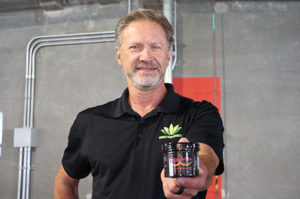Not all stores will skyrocket if Missouri legalizes recreational cannabis, but even flawed expansion is ‘well worth it’, advocates say
LRecreational marijuana equalization would have powerful results statewide if Missouri voters approve a constitutional amendment on Nov. 8, but some cannabis advocates and small-business owners say not all strains of success will be equal .
On the one hand, Missouri Amendment 3 erase the criminal records of people who have previously been charged with non-violent marijuana and potentially de-stigmatize the industry; and secondly, the amendment caps the number of licenses to grow and sell cannabis. The latter makes it difficult for many small business owners to access legal marijuana operations, said Rich Dunfield, founder and owner of Native Hemp Co. — a CBD store located in Lee’s Summit, Missouri.
RELATED: Voters in some of the most conservative states to weigh in on the recreational pot
“I understand that for the average Missouri resident, this Amendment 3 probably really works, and that’s great,” Dunfield noted. “But there is another aspect to this that I would have preferred to have had the option of making more licenses available. I have been working in cannabis every day for five years and would be considered a successful small cannabis business. I have no chance of buying a license.
Click on here to learn more about Rich Dunfield’s entrepreneurial journey with Native Hemp Co.
Since Missouri legalized medical marijuana in 2018, the state has issued approximately 200 dispensary licenses and 65 cultivation licenses. Under Amendment 3, a minimum of 144 new licenses will be issued; it prioritizes those who already have medical licenses and have the highest capital, Dunfield explained.
“I understand why they drafted the bill this way. This is one of the biggest investments the state will make, and they want to minimize risk by working with people with big money,” Dunfield said. “However, they also downplay innovation and fairness with this mindset.
“…A lot of people come together – so if there’s a person with money, then a great thinker and a good operator, that’s often how companies come together,” he said. he continued. “I would like to see room for small shops that do everything on their own because, again, that’s how innovation happens.”
Teaming up is exactly how Michael Wilson and Ronald Rice co-founded Franklin’s hideout, a manufacturer of cannabis products that supplies dispensaries in Missouri. The entrepreneurial duo secured one of the last medical marijuana licenses in Missouri after connecting with a business broker and raising much-needed capital in less than three months, Wilson recalled.
“It’s virtually unheard of to go and raise $2 million in capital in less than 90 days and then apply it to build an entire manufacturing facility in less than four months,” Wilson said, noting that most companies must spend between 10 million dollars. $30 million to enter the market. “Everyone involved with us is very pro-entrepreneur and really supportive.”
The Franklin’s Stash House team is based in Kansas City, Missouri. It is made up of 12 people, which is the smallest team that Wilson would recommend for those with a license to manufacture infused products.
“The average team is 20 to 25 people, and then a large culture requires, on average, 25 to 50 people,” Wilson said. “We certainly want to see more people with licenses, but I would ask that people understand that this regulatory environment is like a pharmaceutical facility and a high-quality food factory – and that comes at a cost. You have to fundraise for lawyers, accountants, and regulatory experts, so it’s not possible to do a one-man or one-woman show in Missouri.
Click on here to learn more about Franklin’s Stash House.
Micro business licenses
Amendment 3 also includes a micro-enterprise licensing program for disadvantaged people looking to grow or sell recreational marijuana. According to the amendment, micro-enterprises would only be allowed to work with other micro-enterprises. Micro-enterprise licenses will be allocated through a lottery process. The criteria for who can apply for the microenterprise license are still uncertain.
“We don’t know enough [the microbusiness licensing program] to see if it helps our business in any way, but I really hope it helps other people get in on this game,” Dunfield said.
Wilson co-founder Rice is eager to connect with those who obtain micro-enterprise licenses and provide them with the education and resources his team needed to succeed, he shared.
“We are very passionate about the success of micro-licensing,” Rice said. “We spend a lot of energy training entrepreneurs and the next generation of micro-licensing.”
RELATED: Will Missouri Voters Make Weed Legal This Election? Amendment 3 is not so simple
Economic impacts
Missouri’s planned 6% recreational marijuana tax is expected to bring in millions of dollars in revenue for the state. The cannabis industry presents a whole new look at the economy, Wilson said.
“You have to consider that this is a new industry that has been invested in and that [Missouri Department of Health and Senior Services] has to handle it,” Wilson said. “It won’t be perfect because you’re talking about a giant bureaucracy running something that’s a new industry.
“Ultimately, you can’t issue more licenses right now because there’s not enough demand until marijuana becomes recreational,” he continued. “When demand exceeds supply, DHSS can take a look and see if there’s anyone micro-licensing they want to bring in or if they want to issue more licenses. When we see mismanagement, we see a total collapse of the industry which then needs to be completely overhauled.
Oklahoma, one of Missouri’s neighboring states, legalized medical marijuana in 2018. Oklahoma’s low barrier to entry – around $2,500 to obtain a license – led to the opening of an unprecedented number of dispensaries across the state. This has led to companies selling out of state, which violates state and federal laws and is considered black market marijuana. State officials asked $4 million to fight illegal farms and businesses.
If Amendment 3 passes, Dunfield acknowledged that small shops like his are likely to face intense competition from dispensaries that sell recreational marijuana.
“We will always do what we do – which is to make all the high quality cannabinoids that we are licensed to make from the hemp plant,” Dunfield said. “For every other store open, I think there will be as many people interested in cannabis. And the competition may encourage us to be more innovative, but that’s not something that scares me.
“We have the ability to sell more than marijuana, cannabis and hemp,” he continued. “We can have lineups like cocoa drinks, mushrooms, certain vitamins and mineral ratios in cold drinks and baked goods. Customers will likely see us transform more and more into a cafe and bar that focuses on these active ingredients with very personalized customer service.
RELATED: Credit Laws Could Slow Potential Missouri Marijuana Industry Boom
More cannabis users in (and out of) Missouri
For Steve Gardner, the co-founder of House of Kush, Amendment 3 is a way for him to expand his business in Missouri. Although House of Kush is based in Kansas City, Missouri, the company is focused on licensing, marketing, and branding across the country and beyond.
“We do business in eight other states and three foreign countries — Israel, Austria and Germany — but we’ve started looking at the Missouri market and identifying who we’d like to work with,” Gardner said. “I was born and raised in Kansas City, so I love this city and it will be even better when [marijuana] becomes recreational.
As a longtime advocate for cannabis use, Gardner hopes the potential legalization of recreational marijuana will change the narrative around the cannabis industry, he shared.
“Having worked with many professional athletes, I’ve seen many of them use it after their playing careers have ended for joint pain, head trauma, sleep issues and all the other issues they were meeting,” Gardner said. “I hope this helps people understand the very real medical benefits this herb brings to people.”
On the Kansas side, Gary Upah, founder of Soggy Bottom Hempbelieves Missouri’s election can push legalization beyond state lines.
“There’s talk now that if Missouri becomes recreational, with the state line dividing Kansas City down the middle, there’s absolutely no way we can keep marijuana out of Kansas,” Upah said. “I think this will force Kansas’ hand to at least take the discussion seriously.”
Ultimately, if Missouri voters decide to pass Amendment 3, it will give more people access to marijuana, Wilson said.
“Whether the amendment is perfect or not perfect today is going to take time to change,” Wilson said. “To me, postponing legalization is postponing a patient’s ability to obtain a more affordable and accessible product. The number of people who can be cured and have peace of mind thanks to cannabis is well worth the effort.
This story is possible thanks to the support of the Ewing Marion Kauffman Foundationa private, non-partisan foundation that works with communities in education and entrepreneurship to create unusual solutions and empower people to shape their future and succeed.
For more information, visit www.kauffman.org and log in to www.twitter.com/kauffmanfdn and www.facebook.com/kauffmanfdn








Comments are closed.